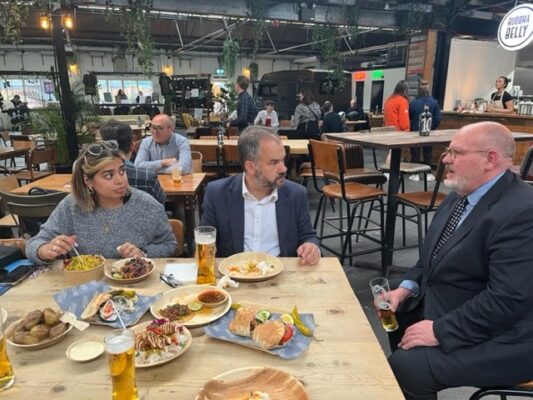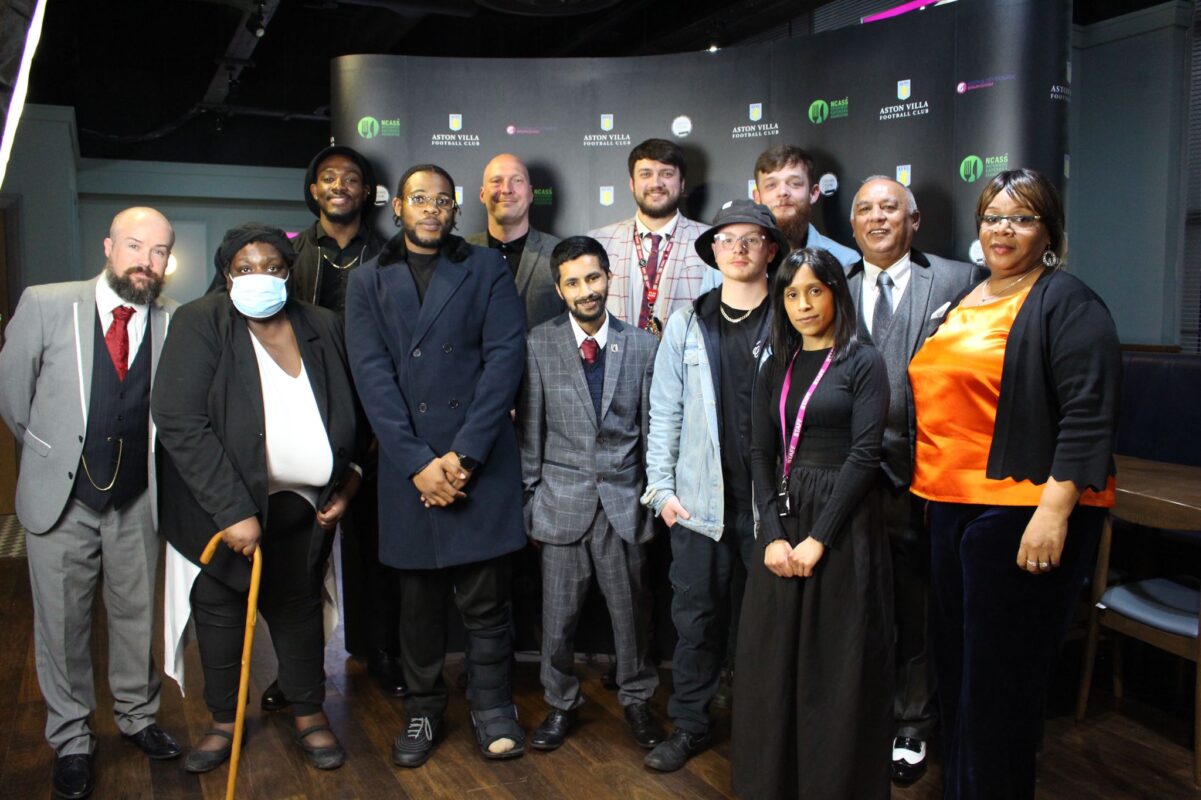On 12th May, the first cohort of Villa Catering club trainees graduated. The project provided learners with real life work experience, advice on setting up their own food business and qualifications in catering and hospitality. The project was delivered in partnership with Digbeth Dining Club CIC, South & City College Birmingham and NCASS. We sat down with NCASS Director Mark Laurie to find out more about the project.
Can you give me a brief overview of the project?
The project was created by Aston Villa in the Community, in association with Digbeth Dining Club CIC, NCASS and South and City Birmingham College. The idea was to help people in the local area, who have been out of work either due to their age or possibly injury or illness, to get training in hospitality and catering. The aim was to build up their confidence and to give them the skills and qualifications to be entrepreneurial and create their own businesses.
What was NCASS’ role in the project?
NCASS, along with Digbeth Dining Club and South and City Birmingham College, provided training in many different formats. Traders from Digbeth Dining Club came in to talk to the trainees, whilst I presented some workshops on street food and entrepreneurship. NCASS also provided online training and South Birmingham College provided classroom catering education. The trainees had 364 hours of training, over 16 weeks, which included work experience with street food traders. The goal now is to help those trainees, who have worked through the course, to hopefully launch their own businesses. Three of them have already done so with others following suit in the coming months.
What was it like working with Aston Villa in the Community?

It’s been a really successful project funded by the Premier League Charitable Fund. The Aston Villa in the Community team have been absolutely fantastic, extremely focused, knowledgeable and incredibly supportive of everyone going through the course. They’ve been really tuned into the concerns and needs of the trainees and so they’ve led the way in facilitating everything and making them feel comfortable and valued. They’ve been superb.
How did the project come about?
NCASS has been working on the Sefton Pilot Project for some time. We have developed the blueprint for the project, part of which includes a training scheme, over the past year. We were working with Digbeth Dining Club on how to further develop that and in that time, Aston Villa got in contact. So, we had already done a lot of the work to get it ready and we were then able to apply the blueprint that we had developed for Sefton, to Aston Villa. One of the great things about this whole process is that it has demonstrated that the Sefton Pilot Project can work. It’s been a great indicator of the power of independent hospitality and unlocking the latent talent within the community.
How do you unlock the latent talent of a community?
Some people don’t necessarily have the support or encouragement to start their own business and it’s a big commitment, if you’ve got limited cash. It can be a risk to put that money into setting up a business. But there are lots of people with incredible talent that will never get recognised unless we find a way to unlock that.
So, it’s important to focus on communities who have arguably been neglected over time and say to them “this is for you and we’re here to help you to develop your ideas and your food.”
Then the hope is that the more diverse street food can be, the better it will be, because the more people out there doing interesting things, the stronger the industry will become. Setting up a street food business is one of the more affordable businesses that you can set up, but a lot of people still won’t be able to access that. There can be different factors as to why, some people may think that it’s just not for them or that the necessary systems aren’t in place to support them and help them to overcome different barriers. We want to blast through those concerns and support and develop these ideas. So, in that sense, the project was quite bold.
What was the aim of the project?
If we’re going to get out of the economic turmoil that we’re currently in, then we need to build from the bottom up. We need to generate wealth within local communities and encourage people to bring their custom into those communities, rather than prioritising massive corporations who may not necessarily bring jobs with them. What we want to do is bring money into the community to regenerate those areas, support people and set the example to others that it is open to them and they can do it too. Food is a great leveller.
Tell me a bit more about the trainees.
It’s been really lovely meeting all the trainees and all 10 that did the course graduated. They come from very diverse backgrounds and they all had their own obstacles to overcome. It was a big step for them, they did incredibly well and we are really proud of them. They worked so hard and came together as a team to support each other through the project. The catering training provided by South Birmingham College was superb and they all really enjoyed the course. Hopefully we’re going to be looking at some new street food businesses coming through because of their hard work. Even for those who don’t open their own business or have decided to wait, the hope is that this has given them the opportunity to get into the hospitality industry in some capacity as they have also earned a Level 2 Hospitality and Catering NVQ.

What did the trainees have to do?
It started off with a Dragon’s Den style event. They had 24 hours notice to come up with a business idea and pitch it to us. It was all very raw, because that was their first day on the course and we didn’t really know what to expect. But they had all done their homework and it was remarkable. Parts of it were really impressive and other parts were intimidating from our perspective and we worried we might have bitten off more than we could chew, but the trainees completely proved us wrong. Over the next 16 weeks everyone got on with it and their passion and dedication to the project came through. Then when the course finished, we did another Dragon’s Den style event and you could see how much they had improved in those four months. It was incredible.
Did any of the trainees have prior industry experience or was this a new venture for them?
They were mostly home cooks who had been cooking for people during COVID who were so impressed they suggested they consider it professionally. One trainee was a foster carer for decades but had to retire due to an injury. He began cooking for people during the pandemic and it became so popular that people started paying him. Then he got a van and started trading outside a social club in the West Midlands. Another trainee, she had so much fun, she loved it, lives in Barbados for half of the year because she runs an organic chilli farm over there. She makes chilli rum (possibly the hottest thing I’ve ever drunk) and she wanted to do the course because she has had some health issues that have forced her to take a step back from certain processes and so she wanted to learn about different ways to distribute her product. So, it was a slightly different angle for her involvement. But the other trainees were definitely very interested in street food and learning how to move forward with that and they all found their own niche which is fantastic. One trainee wants to be a tea specialist!
What will this mean for the trainees going forward?
They all had really great ideas and I’m really proud of them for getting through the training. I’m also proud of the partners who worked on the course; I’m glad we did it! It was great that a government minister recognised their hard work and came to the graduation and to engage with the trainees. Hopefully this will lead to more opportunities for people who are either already trading or looking to get into it. They all came into it with an open mind and weren’t just focused on trendy foods that sell. They consistently focused on what they were passionate about, what they enjoyed doing and what they wanted to share with the world. That was one of the most exciting things about it from my perspective, that we have been able to broaden the foodscape of the city by encouraging people’s genuine passion.
MP Paul Scully came to the graduation, what do you think he took away from the project?
He came up on the day of the graduation and met me and Jack from Digbeth Dining Club at Hockley Social Club for dinner. We chatted about street food, independent hospitality and its potential to drive the regeneration of the high street. We hope that this will lead the way in the bounce back of the hospitality sector, especially with regards to improving staffing and getting more people into the industry. What we really wanted to impress on him is that working in hospitality can be a great starting point in life. If you’ve worked in a restaurant, then you can probably handle most working situations! You can sell, you can provide good customer service, you can problem solve and manage your time efficiently – hospitality is a great life skills option. Although it might not be someone’s lifelong career, it is a great career starting point and many street food traders have actually jumped out of the rat race, or other roles that they were unhappy in, to come and do something that they believe in.

The minister was introduced to some of the traders from Digbeth Dining Club and had the chance to hear their stories and talk to them about how they handled the pandemic and what they’re goals are moving forward. He tried some food from different vendors and I would say had a lovely time! It’s the first time a government minister has ever gone anywhere with NCASS, so it was a real honour to show him what we as an industry have achieved and talk to him about the possibility of street food and independent hospitality to help city centres and the wider economy to recover.
How can street food and independent businesses help the country to recover?
There’s been so much change post COVID. Many high street retailers have moved online and the hospitality businesses that they had a symbiotic relationship with have been struggling because of that. All city centres are struggling and at NCASS we see the opportunity to try a new way of doing things, rather than trying to get back to ‘business as usual’ pre-pandemic. We can’t pretend that the world hasn’t changed, that is just not going to work, so we need to find new solutions and I think street food, placemaking and an experiential economy is exactly the way to do that. I think the government are now more aware of that way of thinking.
What role do street food and independent businesses play in this?
We are a very ethnically diverse nation and we’ve got a great pool of food heritage to draw from and that’s brilliant for street food. Both street food and independent businesses have the potential to restore pride in place and regenerate the community whilst bringing wealth into that community. It’s important to start by putting wealth into the community in order to create a culture of good food and social spaces where people can meet and be a community in every sense of the word. As opposed to large corporations, street food and independent businesses can be more readily available to everyone, more affordable for everyone and representative of that place, so the local community have something that belongs to them that they can be proud of. In Birmingham for example, people are very proud of Digbeth Dining Club. What we then start to see is a wider entrepreneurial spirit that inspires people who may not be interested in cooking, but are passionate about painting, making clothes, floristry or whatever it may be. By combining that with hospitality, it encourages people to do incredibly unique things, we’ve seen this at Digbeth Dining Club, GRUB Manchester and Peddler in Sheffield. In each location, street food has acted as a beacon and drawn in other independents and entrepreneurs.
How can projects like this help to diversify the high street?
As I mentioned, if you have hundreds of unique people, developing unique ideas around the country, then you are going to have lots of unique sites around the country. The result of that is interesting, one-of-a-kind food, that will be symbolic of its area and then we can hopefully begin to overcome the homogenisation of the high street. If we can kick off this independent spirit, like we’ve done in Digbeth and hope to do in Sefton, then it will continue in other places as well. The cohort that has just graduated have been crucial in demonstrating that this sort of this can be done and that the talent is out there. When people are given the right support, they can go and do brilliantly interesting things. That’s the cool thing about having hubs of independent hospitality around the country and of course it can also tie in with tourism development and the like. This project has proved that the Sefton Pilot Project and other similar projects can work (fingers crossed!).
Has the project exceeded your expectations?
I don’t think we realised what we were actually starting! I don’t think we realised the capacity of it or what it was going to take to deliver it or what kind of people would sign up to it. But what we found was that street food opens people’s perspectives to what good food is. By presenting all this amazing diverse food on the same platform, we can hopefully level out that misunderstanding and open people up to food from all around the world. And then they’ll just have a better life because the more food you like, the better everything is!
But seriously, we did not know if this would work. We didn’t know what talent was out there, or how the trainees would respond. The fact that everyone turned up, worked as a team, got through the course and had the imagination to develop a food concept that could work, was both a delight and a relief. I’m not exactly sure what my expectations were – but I’m certain that the trainees exceeded them!
So, what happens next?
The revival of the hospitality sector is going to come from innovative independent businesses and entrepreneurs who are going to change the game by coming up with new ideas and new ways of doing things that move things forward. Ensuring that people have access to the necessary support to do that is going to be a real game changer for those involved and hopefully for others in the community as well. The next cohort of trainees have already begun, and we hope to be able to increase the support put into the project so that we can get even better results at the end. This will give scope for other expansion projects in Birmingham and hopefully across the country in the coming months.
Congratulations to all the graduates! We can’t wait to see what you achieve next and good luck to the next cohort of trainees!






 Featured Training
Featured Training
OUR MEMBERSHIP
We're here to help make your catering business a success. Whether that be starting up or getting on top of your compliance and marketing. We're here to help you succeed.
Want our latest content?
Subscribe to our mailing list and get weekly insights, resources and articles for free
Get the emails